Today, I have ten different homemade anal lube ideas for you. From using coconut oil to aloe vera gel with flaxseed oil, you’ll find a recipe that works for everyone.
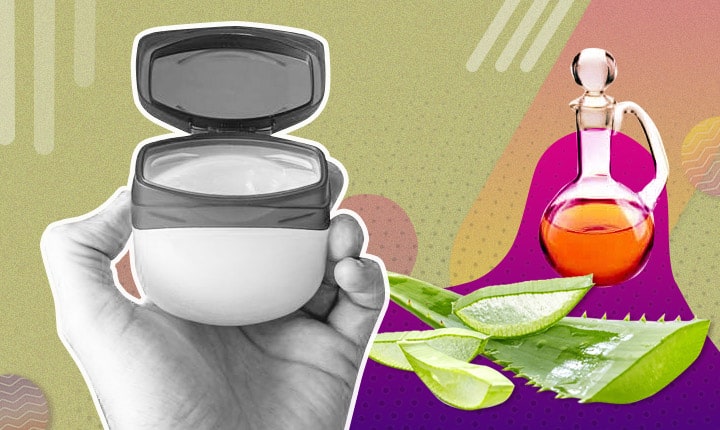
We’re always concerned about the food that we put inside our bodies, and more and more people seem to be looking at the ingredients in the lube as well.
While it’s so much easier and more convenient to pick up a lube in your supermarket, some of the lubes do have quite a lot of nasty ingredients in them.
So, if you’re concerned about what you put inside your body, in this post, you’ll find organic and safe homemade alternatives to anal lube.
It can be so much more fun and satisfying knowing what ingredients are going into your lube.
So, let’s jump right in!
What’s So Good About Anal Lubes?

Trying out anal sex without lubrication is a recipe for disaster, but what makes anal lube different from regular lube?
The Thickness
Did you know lube comes in different viscosities?
There’s a huge range to choose from, but lube for anal sex is usually much thicker than those used for vaginal penetration.
Many vaginal lubes are designed to match the viscosity of your body’s natural lubricant. This means they end up being fairly thin.
Anal lubes, on the other hand, should be thicker.
There are a few reasons for this.
Firstly, since there are no natural lubricants to match, lube can be made thicker.
Secondly, anal sex tends to produce more friction, so your lube needs to last longer to counteract that. Thicker lube tends to last significantly longer and requires less.
And lastly, thicker lube will better cover the thin walls of the rectum, making for smoother sex. This helps avoid any small rips or tears in the anal or rectal lining.
The Desensitizing
A lot of anal lubes on the market include numbing or desensitizing agents. They’re designed to alleviate discomfort or pain during anal sex with compounds such as benzocaine and lidocaine.
However, these chemicals can also cause itching, burning, or tingling in some people.
Even though many lubes include a numbing agent, we recommended never to use numbing lubes, gels, or creams for anal sex.
It’s important you listen to your body, and if you’re experiencing any discomfort or pain during anal sex, it’s a good sign you need to change something, slow down, or stop.
Numbing creams can stop you from receiving your body’s important messages and lead to injury.
7 Household Anal Lubes
Let’s start by taking a look at your pantry.
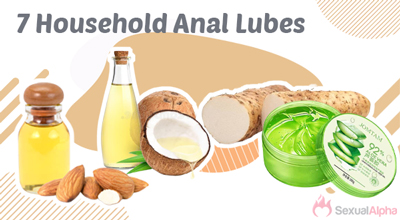
These four household items are perfect for use as anal lube alternatives, and you probably already have them in your kitchen:
1. Aloe Vera Gel
Your best option for an anal lube alternative would be to use aloe vera gel.
It’s natural, water-based and is known for its hydrating abilities. Also, it’s very soothing.
Aloe vera is also very safe to use with condoms, as it’s water-based and doesn’t degrade latex.
You can either get aloe vera by gathering the gel from the plan yourself. It’s not a hard task, but it can get messy, and you’ll need a few tries to cut the plant properly.
You can then mash the gel and store it in the fridge.
However, remember that it’s a natural product, so it won’t last very long. It might be better to gather it for a few uses at once.
Your other option would get an aloe vera gel already packaged from a shop.
It’s an easier option, but you have to check the labels as some products might have additives and chemicals.
2. Almond Oil
Almond oil is another great homemade anal lube option for you.
It’s rich in vitamins, hydrates the skin, and smells nice.
You can easily get a bottle of almond oil on Amazon, and it’ll last you a long time if you keep it in the fridge.
But keep in mind that almond oil, just like most of the other oils, degrades latex condoms, so if you’re using condoms for anal play, it might not be for you.
3. Coconut Oil
Now my personal #1 recommendation for a homemade anal lube is coconut oil.
It’s natural, safe, and smells and feels nice.
While I don’t recommend using it during vaginal sex as it can cause infections like all the other natural products, using it for anal is perfect.
Coconut oil comes in a solid form, so when you’re about to use it, either warm it up over hot water or simply rub it between your palms, and it’ll become runny.
You can find more about the use of coconut oil for masturbation in our article here if you’re interested.
Warning:
Coconut oil also degrades latex condoms, so keep that in mind if you’re planning on using it for anal play.
4. Plant-based Oils
Plenty of plant-based oils make great anal lube—as long as you’re not using latex condoms.
Oil-based lubricants will degrade latex, so play it safe and stick with water-based lubes if you need to use a condom.
Aside from coconut oil and almond oil, you can use pretty much any vegetable oil for anal sex. It’s an easy and affordable option that you’re likely to already have around the house.
If you’ve ever used vegetable or olive oil for cooking, you already have a good idea of their viscosity.
They’re slippery enough to use for anal sex and thick enough to be long-lasting.
Just be sure to protect your sheets and mattress – rancid oil smells in the bedroom are nobody’s idea of a good time.
5. Spit
That’s right, ol’ faithful spit is still a contender.
If you really have nothing else on hand, saliva can be used to make anal penetration easier.
It’s more of a last resort, though, so just make sure to go super slow with this one.
Saliva tends to dry up very quickly.
So unless you have an endless supply of drool, you’ll be hard-pressed to make this work for very long.
6. Vitamin E
Vitamin E has a host of amazing benefits for the skin and is often used in anti-aging creams to help maintain the skin’s elasticity.
So if you want a younger-looking butthole, read on!
Jokes aside, vitamin E oil is an easy choice for natural anal lube.
It’s nourishing to the skin, thick enough to last as long as you do, and easily accessible.
Just make sure you don’t use it with condoms, just like the other oil-based lubes on this list.
7. Chinese yam
This might be on the more obscure side for some people. But if you have access to it, Chinese yam can be used to make a great natural lube.
Chinese yam – also known as nagaimo – is a root vegetable that produces a thick mucus-like substance when cut, grated, or cooked.
This is apparently an old trick and less common these days, but if you’re feeling adventurous, you can hunt down some Chinese yams and try it for yourself.
Just make sure you remove the skin with gloves first, as it can cause irritation.
If your local Asian grocer doesn’t have them, nagaimo grows wild in Florida, Tennessee, and even New York. Happy foraging!
3 Homemade Anal Lube Recipes
If you’re interested in making your own homemade anal lube and not just stopping with using coconut oil, I have a few great recipes for you:
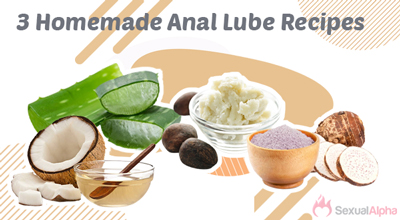
1. Coconut Oil and Shea Butter Delight
If you’re a fan of oil-based lubes and don’t worry about using latex condoms, then this recipe is going to be for you.
You’ll need just a few ingredients:
- Pure, high-quality coconut oil
- Shea Butter
- Mixing bowl
- Container for storage
Combine your coconut oil and shea butter in your mixing bowl. The ratio should be 2 parts of coconut oil and 1 part of shea butter.
The more shea butter you’ll add, the thicker your homemade lube will be.
Put the bowl inside the microwave and heat it on a low setting until both ingredients are melted.
Once everything is melted together, pour it inside the storing container and pop it into the fridge until it’s time to use it.
I recommend not storing it longer than a few weeks as it’s a natural product with no preservatives.
2. Aloe Vera Homemade Anal Lube
If you love the idea of using soothing aloe vera gel as lube, this recipe is going to be for you.
You’ll need:
- 1/4 cup aloe vera gel
- 1/4 cup flaxseed oil
- 4 drops of peppermint essential oil
- 12 drops of Sensation essential oil
Just mix all of the ingredients in the bowl and transfer it into the container for storage.
Store it in the fridge as it’s a natural product and doesn’t leave it for more than a week as aloe vera can go bad.
This recipe is based on creating a homemade anal lube that is sensual and enhances your sexual experience with a pleasant smell.
You can easily adjust how much essential oil you will be adding, as some people might want less, and some people might want more.
If you’re not sure that having a smell is your jam, simply skip the essential oils and only use aloe vera gel with flaxseed oil.
As this recipe is partly oil-based, it’s not to be used with latex condoms.
3. Best Natural Water-Based Lubricant
Now, if you are a condom user and want a homemade anal lubricant that is safe to use with condoms, I also have a recipe for you.
There are only two ingredients you’ll need:
- 1 cup of cold water
- 4 teaspoons of arrowroot flour
Pour the water into a pot and turn on medium heat.
Add the arrowroot powder and start stirring. Once you see the texture change and become more gel-like, turn off the heat.
Pour the liquid into your container for storage and let it cool. Store it at room temperature.
You can also add some essential oils into this homemade lube, but be wary that once you add them, it’s no longer a condom-safe lube.
Dangers, Safety Precautions & Household Lotions To Avoid

Allergies
Some of the items on this list (or any others you end up trying) have the potential to cause allergic reactions.
It’s always a good idea to do an allergy test before using something new.
You don’t want to find out in the middle of anal sex that almond oil makes you break out in hives.
The easiest way to be sure is to dab a small amount of your lube in the crook of your elbow. Wait 24 hours to see if there are any reactions before using it during sex.
Chemicals
Not all chemicals are the devil’s playthings, but there are some you might want to avoid when looking at anal lube.
In general, it’s a good idea to stay away from parabens, which some studies suggest may be linked to breast cancer.
Others, like glycerin, can cause yeast infections, and propylene glycol can cause irritation.
Lastly, L-Arginine can trigger herpes outbreaks in people carrying the virus so better to steer clear of that.
Ingredients
Whether you buy anal lube or make your own, there are some ingredients you should avoid.
Make sure you read the ingredients to be sure everything in your chosen lubricant is good for your body.
If you’re making your own, there are a few household items that look the part, but should never be used as a lube substitute.
Anything containing animal proteins can be easily contaminated and quickly go bad, so butter is a no-go.
Egg whites and fish oils have similar issues. They’ll also leave you with a smelly memory of what should have been a pleasant experience.
Sugars, syrups, and honey are basically a one-way ticket to a yeast infection. They are way too sticky to make for a smooth experience.
In addition to avoiding the chemicals we mentioned above, you should also steer clear of petroleum. It could degrade condoms, cause infections, and potentially risk cancer.
4 Household Items To Avoid As Anal Lubes
Now, there are also items that you might be tempted to use, but they’re actually dangerous to use as anal lubes:
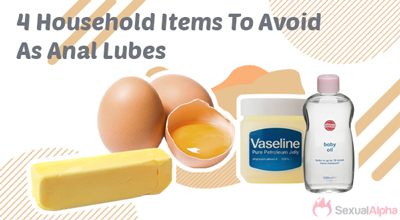
1. Vaseline
Vaseline might be tempting to use it as a homemade anal lube.
It’s something very familiar to us and very cheap, right?
While it might be tempting, I recommend staying away from using it as a homemade lube.
Not only does it degrade condoms because it’s an oil, but it can also cause a whole heap of infections.
And it’s always better to stay clear from that!
2. Butter
Now, it might be tempting to use butter as an anal lube as it’s an oil, just like coconut butter, right?
And some people use it, and they’re happy and have no complaints.
However:
Butter is an animal protein, which is not the best thing to put inside your vagina or butt.
It can cause infections and make things uncomfortable down there, so I personally would avoid using butter as a lube.
3. Eggs
Some people are so original that they suggest using egg whites as natural homemade lube.
But I recommend you stay away from that.
Not only is it not healthy to get animal protein anywhere close to your genitals, as it can cause infections.
It’s also dangerous because you can catch salmonella if you use raw eggs on your vagina or anus.
I recommend staying on the safer side, even if egg whites are great for anal sex and stick with other natural anal lube alternatives.
4. Baby Oil
This might seem like a good idea, but baby oil isn’t recommended as a sexual lubricant. Most contain fragrances that can irritate the sensitive inner lining of your rectum.
Because baby oil is not a natural oil, it can change the natural pH of a vagina. Even when you’re not engaging in vaginal penetration, if the receiving partner has a vagina some oil may find its way there and cause problems.
Even anally, the petroleum-based oil is very sticky and difficult to remove. This could end up causing infections if left inside you.
How to Apply Household Anal Lubes
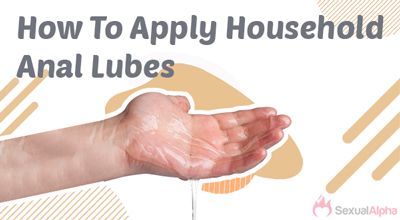
Nobody likes a cold surprise in their holiest of holies (unless you’re into that, in which case, carry on). It’s a good idea to warm your lube up in your hands before applying.
You want to get the best coverage possible for anal sex, so put a generous amount of lube around and inside your anus before you start.
The best way to do this is with a small anal dildo. This will help spread the lube inside without being too overwhelming.
Make sure you lay down some sheets or towels to protect your bed, and reapply lube as necessary. Most importantly, talk to your partner – feedback is the key to great sex!
Other People Tips, Experiences & Techniques
Now, let’s look at what other people on the internet are saying about using homemade lubricants for anal sex:
This. A million times this.
My SO and I have stopped buying any other lube (for either hole) and now use coconut oil for everything. It works great! Plus it smells good. I also use a lot of it as just plain hand/skin moisturizer. Pretty amazing stuff.
Many vegetable oils, the one we’re using to cook or fry foods, are safe for vaginal, anal and oral usage. Rice bran oil, canola oil and olive oil are no exception. There are three disadvantages though: 1) Cleanup takes a little more effort than using commercial products; 2) the smell; and 3) it can break down latex condoms and silicone sex toys.
The best lube for anything is good old butter. It’s natural, slick, it doesn’t get sticky and it doesn’t hurt latex. Spreadable butter with olive oil is the best. If your mom uses margarine, tell her that butter is healthier. Just skip on down to the fridge and get some lube. The best thing is, your mom is paying for it!!!
Conclusion
And here you have it – everything there is you need to know about making and using a homemade anal lube!
Caring about what you put on your genitals should be as important as caring for what you put inside your body. For other great options, see our best cum lube guide.
So, if you’ve been looking for natural alternatives, you have a massive list to choose from. Feel free to check out our lube guide for more options.
As always, experiment with different things and recipes and see which options work the best for you and your partner!